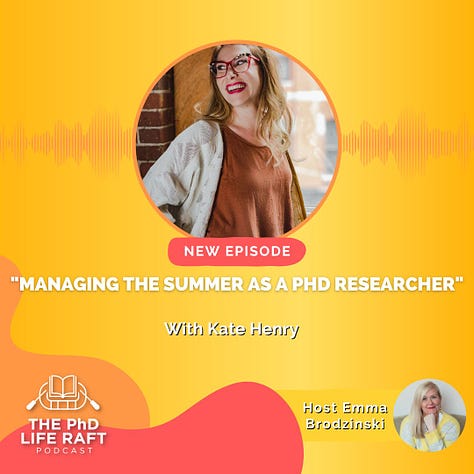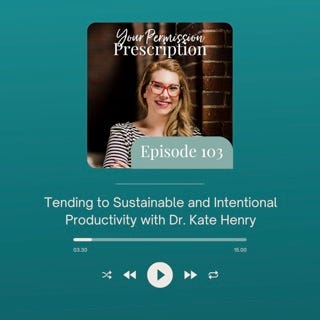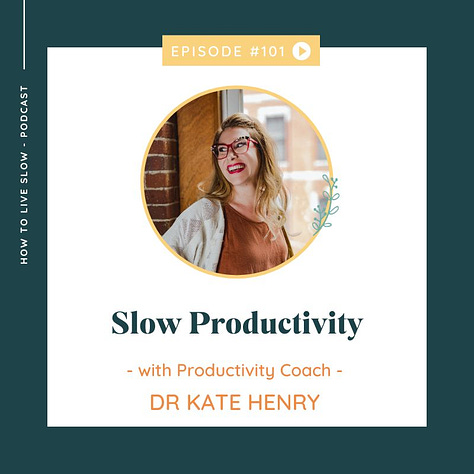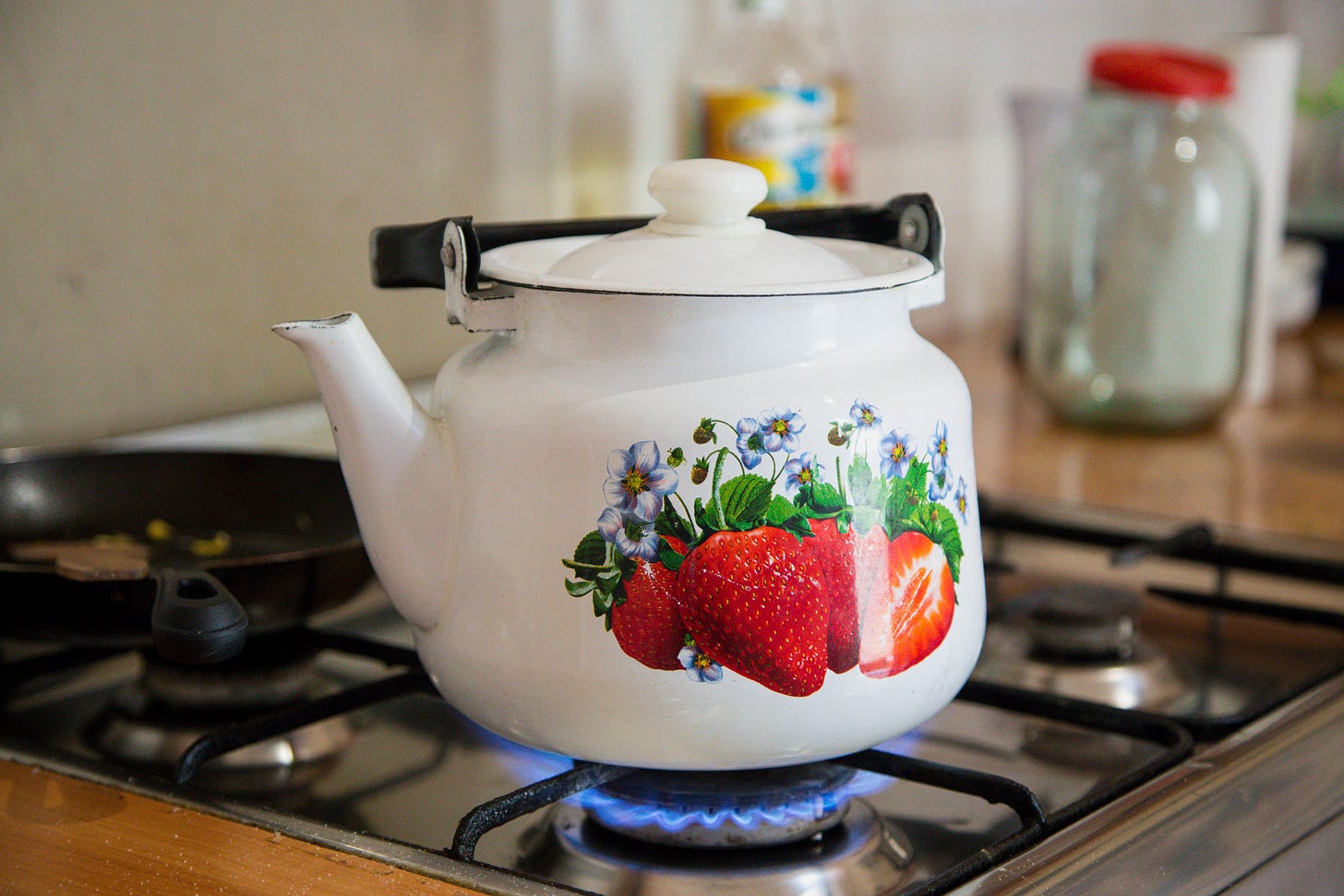You can listen to an audio version of this newsletter above. Please note that this is unedited and I’m recording in my home office. You may hear some bird chirps or Sam the cat purring on my lap.
Inspired by other writers I admire and respect, I want to share the ways we can work together.
I’m currently accepting new 1-on-1 coaching clients, booking workshops with universities and organizations, offering my 6-week Intentionally Productive Scholars Program for undergraduates, and building a waitlist for Perceptible Progress: A Goals Course, which I plan to run in July. If you’re curious about any of these, reach out via email (Kate@KateHenry.com) or schedule yourself in for a free 30-minute chat with me. If you have a pal or colleague who may be interested in my services, feel free to forward this email to them. Thanks!
It’s Podcast Season!
I am so honored that I had three podcast interviews released this May and I love the breadth of topics, ranging from personal development, slow living, and supporting PhD students. Please check them out via the links below.



The PhD Life Raft Podcast: “Managing the Summer as a PhD Researcher with Kate Henry.” Emma and I talk the podcast’s upcoming workshop series, Month of Mondays; I’ll be hosting the June 12th session on productivity! It will be live and recorded and you can sign up here.
Your Permission Prescription with Nancy Levin: “Tending to Sustainable and Intentionally Productivity with Dr. Kate Henry” Listen here via Apple Podcasts or listen via Nancy’s website [note that when the episode was first released, the episode link was going to a previous episode, but if you’re reading late it should be fixed. :)]
How to Live Slow: “Slow Productivity”

I’ve been thinking a lot about the concept of moving things to and from a “back burner.”
When I’m helping my coaching clients build their to-do lists for each month, I often ask, “Should we move any of these tasks to the back burner?”
In other words, “Which projects can you postpone for a little while so you can allocate your precious personal resources of time, energy, and focus to the highest priority projects?”
Fresh off my metaphor of fruition for the writing process, today I’m talking about productivity and the metaphor of a stove top.
One of my go-to meals recently has been rice, garlic green beans, and a pre-cooked sous-vide chicken with a pre-made sauce. I can whip up this meal in 30 minutes, but it requires use of my whole stove top (one burner for steaming beans, another for sautéing the steamed beans with garlic, one for cooking rice, and one for heating chicken).
Even though it’s a meal I make often, I still have to give it my full attention. If I’m not supervising the temperatures and the timing, the rice gets mushy and the beans go limp. When I have more time and attention to give to my process, I make sure the chicken is seared; if I’m tired or hangry, I just make sure it’s hot enough to eat (it’s pre-cooked, so no salmonella here).
As a self-employed coach, consultant, and writer, my workweeks remind me of my stove top management. Some of my work requires daily attention, like reading and responding to client check-ins. Some projects aren’t happening for a few weeks or months, but if they’re particularly complex, I still need to choose the right time to turn on the burner, set something to simmer, or stir the metaphorical pan so I make sure it’s fully prepared before the deadline.
I like to prepare all of the ingredients ahead of time. For a meal like Pad Thai (here’s my go-to recipe), I’ve learned that I will lose my mind if I don’t pre-measure the spices into a little bowl, cut up the herbs, etc. ahead of time. I was chatting with my spouse, Kris, about this last night, and we laughed about how different our approaches are. Kris says I act like I’m on a cooking show, preparing a portion of the meal so I can show it to the audience before I move on. Kris is a Gemini who thrives when the pressure is on; I prefer to triple-check the recipe before I begin. We both make great meals, but different approaches work for us.
Recipe for A Little Less Stress
As I reflect on what I want my experience with my productivity burners to look like in June, I wanted to share my approach in case you find some inspiration in it.
Step 1: Identify what projects I’ll be working on.
This includes things that are due in June and things that won’t happen until Summer or Fall but which I want to start thinking about now. Last week I turned my notebook to a blank page and listed out all the projects I’ll be working on in June. Once I had identified those, I was able to break each one down into a list of tasks so I could see the full scope of how much I have to do next month.
Step 2: Determine times when I’ll have lower capacity to work on my projects.
For me, this meant pulling out my calendar and asking myself:
Do I already have busy days or weeks, and if so, how can I build in blank space so I don’t burn out? This is particularly important for weeks with overlapping deadlines! Scheduling pockets of blank space between my work sessions or meetings will give me time to relax and recharge.
When do I estimate I’ll need a longer break? After focused productivity sessions, It’ll be important for me to take time away from screens to get some sensory rest.
When do I estimate I’ll have more energy? I know I have higher energy in the late mornings and on days when I don’t have meetings, so it’ll be best for me to prioritize more complex tasks for those days.
Taking the burner metaphor further, what if you only have two working burners? If you live with chronic illness, you may be running low on “spoons.” Maybe you need to always reserve one burner for taking care of yourself because if you don’t, you’ll experience a flare. Even if you don’t have a chronic health condition, you might be experiencing a period of stress or an unexpected life event may pop up. How can you give yourself grace if you do not have the energy to do everything you’d hoped?
Step 3: Identify which tasks go on the front burner and which should be on a back burner.
Here are some things you might consider:
Do I have established deadlines with others? Front burner.
Are there specific times when it would be better for me to do a certain project, like a few days I blocked off for writing or co-working sessions? Back burner until then.
Are there tasks that I know I want to do soon because I’m excited or feel urgency, but doing so will stress me out and to be completely honest, they can wait and it won’t hurt anyone? Back burner for now.
Are there tasks that I need to schedule for a time block so I limit the amount of time I spend on them? Or tasks that are feeling aversive but I truly need to complete them soon? Front burner, with extra support (coach, co-working, accountability buddy, etc.)
Now, your turn! I hope you found this exercise as helpful as I did. And these questions are not only valid during the planning process; at any point over the next month, if you struggle with feeling overwhelmed, you are always welcome to pause and return to these questions.
Curiosities
I finished book two of The Atlas Six series and was so excited to request book three from the library until I realized it doesn’t come out until next January! I was so bummed.
With that in mind, I have a request for your magical realism book recommendations. I’m specifically into books about people going to magic school or learning how to use magic (think The Magicians, Babel, The Poppy War Trilogy, Shadow and Bone, The Atlas Six). I love a trilogy.
For Your Consideration
Follow me on Instagram
Order my book, Tend to It: A Holistic Guide to Intentional Productivity
Listen to my podcast interviews
xo,
Dr. Kate











I highly recommend A Deadly Education by Naomi Novik (and the rest of the trilogy is great too)!
I love this metaphor of front and back burners, And
healthy eating!
Just to say your workshop was great during the PhD life-raft summit last November. thanks. I'm looking forward to 12 June - Month of Mondays.
Thanks...